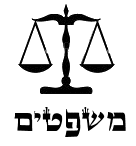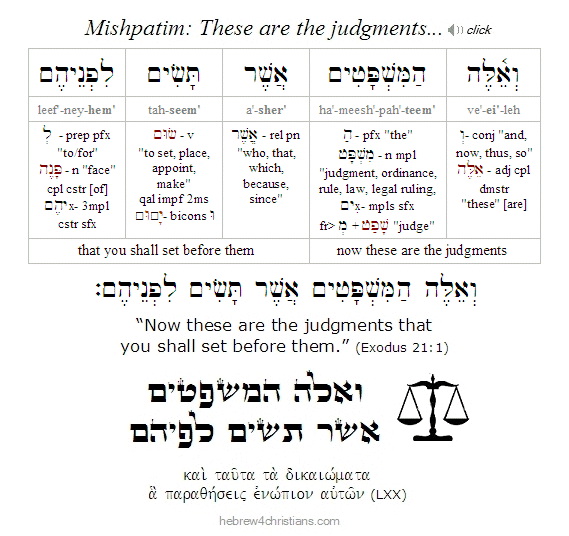|
|
|||||||||||||||||||||
 |
|||||||||||||||||||||
|
Learn Hebrew |
|||||||||||||||||||||
|
Hebrew Word of the Week |
|||||||||||||||||||
 |
|||||||||||||||||||
|
The Hebrew word of the week is the word mishpatim (ΧΦ΄Χ©ΧΦ°Χ€ΦΌΦΈΧΦ΄ΧΧ), the plural form of the masculine noun mishpat (ΧΦ΄Χ©ΧΦ°Χ€ΦΌΦΈΧ), meaning a "judgment," "ordinance," "law" or legal ruling. The word derives from the verb shafat (Χ©ΧΦΈΧ€Φ·Χ) meaning to judge or govern. A shofet (Χ©ΧΧΦΉΧ€Φ΅Χ) is the Hebrew word for "judge," and the LORD is called the Ha-Shofet kol ha'aretz (ΧΦ²Χ©ΧΧ€Φ΅Χ ΧΦΌΦΈΧΦΎΧΦΈΧΦΈΧ¨ΦΆΧ₯) -- the "Judge of all the earth" who loves justice (see Gen. 18:25, 37:28, Psalm 50:6, 94:2). In this connection note that the mishpatim became the basis for the tradition application of Jewish case law as well as for halakhah. According to common Jewish tradition, mishpatim are ethical judgments (or rules) given for a clearly specified reason (i.e., logical laws), as opposed to chukkim (ΧΦ»Χ§ΦΌΦ΄ΧΧ) which are divine fiats or decrees. An example of a mishpat would be the commandment to give charity or the prohibitions against theft and murder. These mitzvot (commandments) are inherently rational since the denial of their validity would make civil life impossible. By application we are commanded to pursue righteousness through the exercise of right judgment: tzedek, tzedek tirdof (Χ¦ΦΆΧΦΆΧ§ Χ¦ΦΆΧΦΆΧ§ ΧͺΦΌΦ΄Χ¨Φ°ΧΦΌΧ£): "Justice, Justice you shall pursue" (Deut. 16:20). In other words, the LORD God expects us to make wise and fair decisions based on the revelation of moral truth given in the Scriptures (Prov. 31:9, John 7:24).
|
|||||||||||||||||||
|
Hebrew for Christians |
|||||||||||||||||||
|
|||||||||||||||||||

